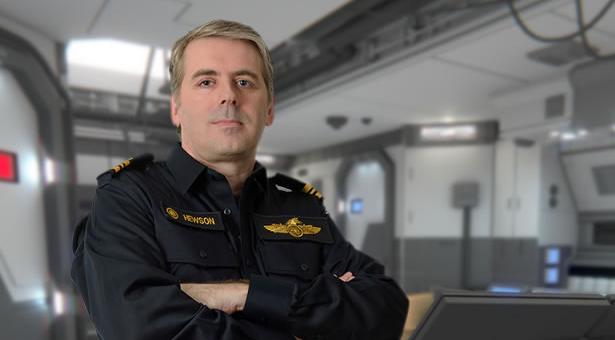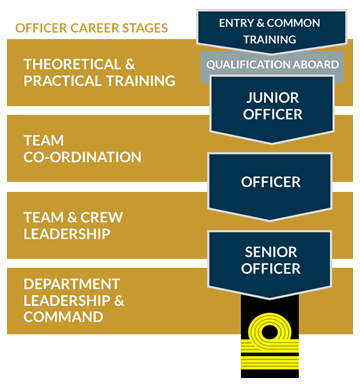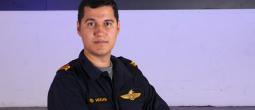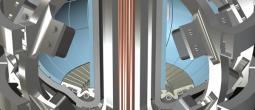

Officers are the senior management of the ISDC, responsible for coordinating the successful completion of missions and projects. Officers are also responsible for the career development of those under their command.
Commissioned officers are military specialists, developing the leadership skills necessary to ensure effectiveness in dangerous and tactically complex environments. While crew typically undertake very technically focused careers, officer careers aim to provide a broader range of skills and experience. This gives officers a wider operational context that enables them to better manage the range of skills and resources available to their mission, department or project.
Officer Career Tracks
Officer career tracks are not as prescriptive as those for crew. It is possible for an officer to move between a number of different specialisations as their career progresses, as long as they have the required training and experience for their desired assignment.
Line Officers
Line Officers are responsible for the operational management of the vessel, its defence and the successful completion of its mission. This includes the navigation, tactical and operations management branches. Line officers can be expected to operate across these different branches as their interest and assignments dictate.
Line officers are expected to gain basic ratings in each of the line branches. As they gain a rating they can serve as a watch officer for that branch, accumulating the required hours for watch qualification, which opens up department leadership possibilities aboard a vessel. Watch qualification across all line branches is a pre-requisite to senior leadership roles.
The most senior line officer (other than the commanding officer) on a vessel is the Executive Officer.
Specialist Officers
There are three specialist branches which require specific technical knowledge and skills from their officers: engineering, science and medical. Each of these branches is represented by its own department on a vessel, each headed by a departmental executive officer reporting directly to the commanding officer.
Career tracks for specialist officers are not dissimilar to line officers, but typically focussed solely within the specialist branch.
Specialist officers are expected to qualify as watch officers but do not have to qualify as Officer of the Deck (OOD) unless they wish to. While there is no policy against specialist officers assuming vessel command, this is not considered a typical career track.
Qualification
While officers are primarily managers, their decision making is informed by operational experience. As such, officers are expected to be qualified on the use of a range of vessel systems early in their careers.
From there, officers build experience supervising teams and systems. The officer qualification system is based on graduated levels of responsibility.
Watch Officer
Watch officers are responsible for their department during a watch.
The watch officer is responsible for ensuring the performance of the teams assigned to their watch and the systems they operate. The watch officer is also responsible for managing any escalations arising during their watch.
An officer must have the system rating relevant to the department before they can stand a watch as watch officer.
Watch qualification is determined by duty hours and an evaluation made during supervised duty as a watch officer.
Officer of the Deck
The officer of the deck (OOD) takes the conn during a watch and is responsible for the vessel’s safety, taking any command decisions regarding the conduct of the ship that do not require escalation.
Even when the commanding officer or executive officer are on the bridge, the OOD must be ready to take the conn if either are required to attend other matters.
Command qualification is determined by duty hours and an evaluation conducted by the vessel’s executive officer including feedback from crew.
Department Head
A department head is responsible for the management of the crew and systems within that department on a permanent basis. This includes managing crew rostering and system maintenance, ensuring that both are available and performing for every watch.
Appointment to a department head role, which requires the endorsement of the department’s executive officer and the approval of the commanding officer.
Command
Command level positions include a vessel’s commanding officer and the executive officer.
Appointment to command level positions is by invitation only. A specialist training program must then be successfully completed.
Rank
The qualification system recognises the skills and experience that an officer has, while rank reflects the level of responsibility and authority held. The two are closely related.
On gaining qualifications on the systems required by their chosen specialisation, officer cadets will become ensigns.
The rank of sub-lieutenant is awarded on receiving a first watch qualification. Department heads typically require a rank of lieutenant and executive officers the rank of lieutenant commander.








